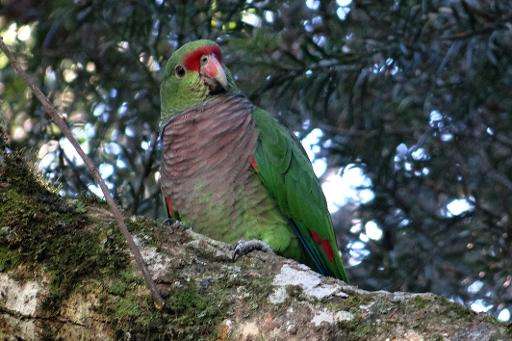A vinaceous-breasted (Amazona vinacea) parrot rests on the branch of a tree in Curitiba, southern Brazil, on May 26, 2015
A South American parrot with a wine-colored chest is in deep trouble, with its population down to some 3,000 and a habitat reduced to a speck of what it once was, researchers said Tuesday.
The Vinaceous-breasted Amazon—Amazona vinacea—lives in just three places in the world: Brazil's Atlantic coast jungle, southeastern Paraguay and the Misiones region of northeast Argentina.
Until now, no field work to study their numbers had been done, but it is estimated there were 10,000 a decade ago, a Brazilian foundation that sponsored the researchers said.
More than 90 percent of the remaining ones live in Brazil, said the study by universities and research bodies in the trio of countries that are home to the stocky, green medium-sized birds with a maroon-purple patch on the chest and belly.
The so-called Charao Project to study them was completed in May.
In Brazil, the birds are now observed on land covering just eight percent of the original habitat, said the Fundacion Grupo Boticario, which financed the study.
Since 2012, this kind of parrot has been classified as endangered by the International Union for Conservation of Nature.
But there were no reliable data on the current size of the population or how it was distributed, a statement from the foundation said.
It said the population figure of 3,000 is 25 percent lower than what had been expected.
"The species is now facing a serious risk since the size of the population is drastically reduced and far below safe levels," said Malu Nunes, executive director of the foundation, based in Curitiba in southern Brazil.
She said the bird should now be classified as "critically endangered."
The foundation will promote campaigns against sales of the birds as pets and the construction of "nest boxes" in the jungle to boost chances of the birds mating.
© 2015 AFP
























